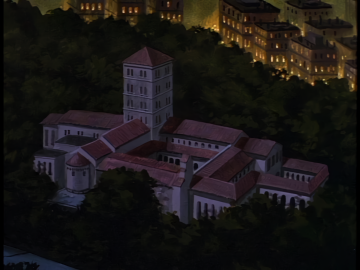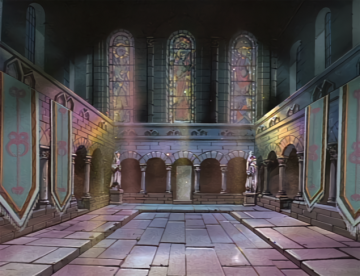Difference between revisions of "Cloisters"
Phoenician (talk | contribs) |
|||
| (11 intermediate revisions by 7 users not shown) | |||
| Line 1: | Line 1: | ||
| − | '''Cloisters''' | + | [[Image:Cloisters.png|thumb|360px|The Cloisters]] |
| + | [[Image:Cloistersint.png|thumb|360px|The Cloisters (Interior)]] | ||
| + | |||
| + | '''The Cloisters''' is a branch of the [[Metropolitan Museum of Art]] in [[New York City]], specializing in medieval art. | ||
==History== | ==History== | ||
| − | + | In [[Timeline#1994|1994]], the Cloisters was the site of [[Demona]]'s temporarily [[Magic|turning]] [[Goliath]] into a [[Enslavement Spell|zombie under her control]], the act which turned [[Brooklyn]] against her. Its medieval nature thrilled Brooklyn, causing him to describe it to Goliath as "like the world we came from." ''([[Temptation|"Temptation"]])'' | |
| + | |||
| + | ==Real World Background== | ||
| + | Founded by John D. Rockefeller, the Cloisters stand in Fort Tryon Park, overlooking the [[Hudson River]]. Its collection is primarily composed of [[Europe|European]] artwork from sculptor and art dealer George Grey Barnard, who acquired the artifacts in [[France]] from various medieval monasteries at the turn of the 20th Century. By 1925, he sold his collection to Rockefeller, who also funded the construction of the limestone complex. It first opened to the public in 1938. Additional philanthropists to the museum included J.P. Morgan and Joseph Brummer. | ||
| + | |||
| + | Today, the various pieces in the collection hail from [[France]], Germany, [[Italy]], Netherlands, and Spain spanning from the 12th through 15th Centuries. It's name is derived from the site's four cloisters, or covered squared walkways comprised of courtyards. The gardens (home to more than four hundred species) in the courtyards are, in fact, part of the museum's living collection, in the effort to research the horticulture from as far back as the 9th Century. | ||
| + | |||
| + | The Cloisters Library is dedicated to collecting research material for studying medieval art and gardening. | ||
| + | |||
| + | ==See Also== | ||
| + | *{{wikipedia|The_Cloisters}} | ||
| − | [[Category:Canon]] | + | [[Category:Canon places]] |
| − | [[Category: | + | [[Category:Real world places]] |
Revision as of 20:18, 1 June 2024
The Cloisters is a branch of the Metropolitan Museum of Art in New York City, specializing in medieval art.
History
In 1994, the Cloisters was the site of Demona's temporarily turning Goliath into a zombie under her control, the act which turned Brooklyn against her. Its medieval nature thrilled Brooklyn, causing him to describe it to Goliath as "like the world we came from." ("Temptation")
Real World Background
Founded by John D. Rockefeller, the Cloisters stand in Fort Tryon Park, overlooking the Hudson River. Its collection is primarily composed of European artwork from sculptor and art dealer George Grey Barnard, who acquired the artifacts in France from various medieval monasteries at the turn of the 20th Century. By 1925, he sold his collection to Rockefeller, who also funded the construction of the limestone complex. It first opened to the public in 1938. Additional philanthropists to the museum included J.P. Morgan and Joseph Brummer.
Today, the various pieces in the collection hail from France, Germany, Italy, Netherlands, and Spain spanning from the 12th through 15th Centuries. It's name is derived from the site's four cloisters, or covered squared walkways comprised of courtyards. The gardens (home to more than four hundred species) in the courtyards are, in fact, part of the museum's living collection, in the effort to research the horticulture from as far back as the 9th Century.
The Cloisters Library is dedicated to collecting research material for studying medieval art and gardening.
See Also
- Cloisters at Wikipedia, the Free Encyclopedia

